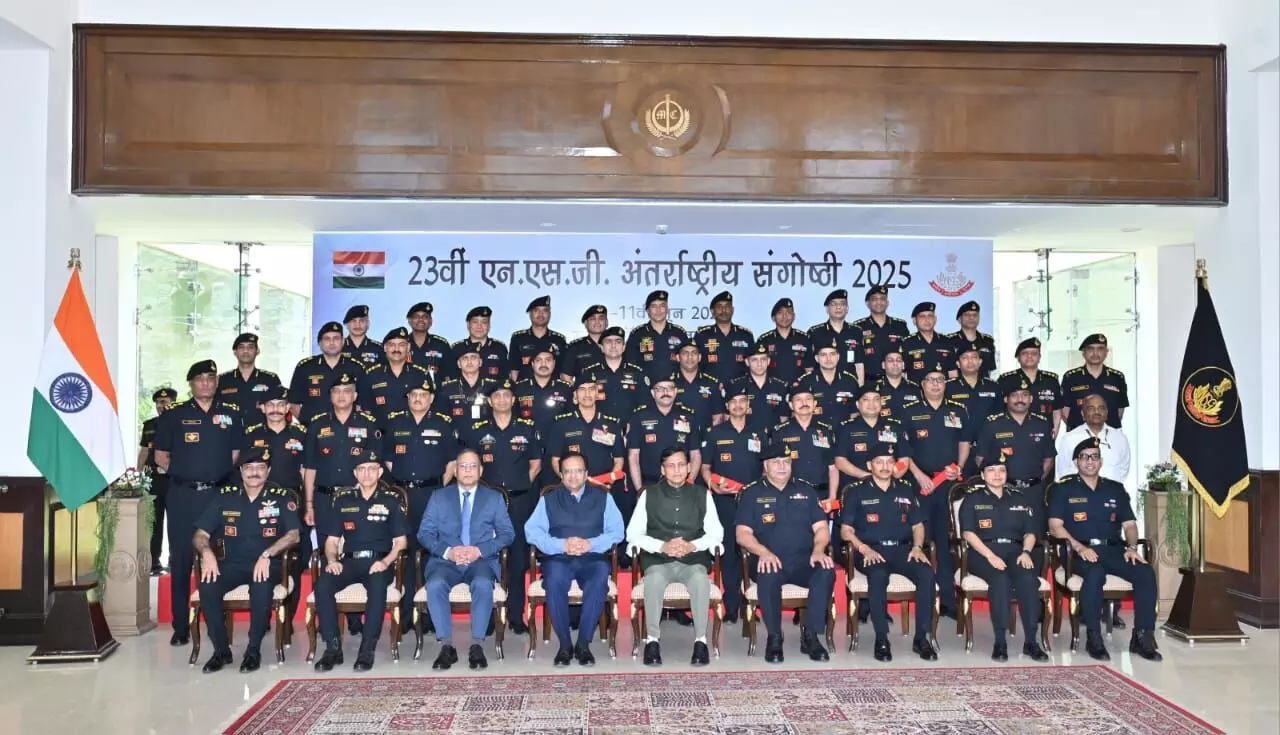
New Delhi, June 11 -- The 23rd edition of the NSG's Counter-Terror International Seminar commenced on Tuesday at New Delhi, under the theme "Forging Collaboration and Innovation to Counter Terror Threats and Address the Complexities of Modern Terrorism." As terrorism evolves into a hybrid, transnational threat, the NSG continues to shape India's Counter-Terror Doctrine in Motion, aligning innovation, interoperability, and integrated response under a national framework. The occasion was graced by the MOS Home, Nityanand Rai, who was the Chief Guest. This two-day flagship event aims to foster inter-agency coordination, operational synergy, and strategic integration in Counter-Terrorism (CT) and Counter-IED operations. As a custodian of the 'Duty to Share' principle, the NSG leads in creating knowledge-to-kinetic capabilities, transforming institutional learning into real-time, field-ready interventions. The seminar reinforces the NSG's role as a strategic fulcrum in India's layered security grid.
Delegations from more than 17 foreign nations, such as the USA, Russia, Japan, Israel, Germany, and Indonesia, are attending, as well as top officials of State Police Forces, CAPFs, the Indian Army, intelligence agencies, and top think tanks. This strong representation raises the seminar to the level of a cross-domain platform for interaction and global best practice sharing, in the spirit of "One Nation, One Response." One of the milestone achievements of this seminar is the Memorandum of Understanding (MoU) among the NSG and State and UT Police Forces. Under the direction of the Honorable Union Home Minister, the MoU paves the way for a first-of-its-kind SOP for unified CT coordination, institutionalized joint training, and First Responder interoperability. The MoU captures India's commitment to transition from disjointed action to a harmonized national response, combining both kinetic and non-kinetic capabilities by a calibrated, interoperable framework. NSG's tactical modules, including Close Quarter Combat and multi-threat hostage rescue, are now being embedded into state-level operational frameworks. In an era where lone-wolf radicalization, grey zone warfare, and asymmetric attacks dominate the threat matrix, rapid knowledge-to-kinetic transformation becomes essential. By anchoring capacity-building under Mission Karmayogi, India is fortifying a CT force that is both agile and adaptable.
The seminar is structured around five high-impact thematic panels, each contributing to the strategic vision of a unified, future-ready counter-terror response mechanism- discussions led by experts from the USA and Israel focused on global CT frameworks, counter-radicalization strategies, and operational challenges in urban combat, helping Indian stakeholders benchmark best practices from friendly foreign countries. Sessions by senior IPS officers examined operational challenges in rural, jungle, and high-density urban areas, addressing region-specific tactics and the critical role of State Special Forces in multi-tiered threat response. Building on the MoU framework, this theme brought the NSG's operational insights from deployments across the nation, including hostage rescue, urban raids, IBUS backup, and counter-drone operations, into discussions for a national CT Grid and Standard Operating Procedure (SOP). Panelists explored emerging technologies like AI/ML, drones, 4IR innovations, and financial intelligence tools. Emphasis was laid on predictive analysis, real-time data sharing, and smart weapon integration for layered CT preparedness. Spearheaded by domain experts, this track addressed electromagnetic-spectrum IED threats, cyber-enabled C-IED tools, and integration of sensors with K9 assets, ensuring India's IED mitigation capabilities are grounded in modern tech and field realities.
The seminar also marks the launch of the 35th edition of 'The Bombshell', the NSG's flagship Counter-IED journal, published by the National Bomb Data Centre (NBDC). With contributions on AI, robotics, predictive analytics, and recent case studies from Post-Blast Operation and Analysis (PBOA) missions, the journal offers a field-tested guide for modern IED mitigation. Alongside, the Quarterly NBDC Bulletin continues to provide critical inputs for tactical planning across India's security ecosystem. Special sessions will deal with countermeasures against drone-borne IEDs, low-cost UAV tactics, and India-specific anti-drone doctrines against the emerging role of drones in global hybrid warfare. The real-time analysis of threat vectors by the NSG aims to future-proof India's CT architecture. In line with 'Vocal for Local' and 'Atmanirbhar Bharat', the seminar will honor five recipients of the C-IED Innovator Award, instituted in 2020 to recognize indigenous, cost-effective solutions from the Army, CAPFs, IITs, startups, and the private sector. The awards, to be presented by Home Secretary Govind Mohan on 11 June, reflect India's commitment to grassroots defence innovation and institutional recognition of field-level impact.
As part of the seminar, an Investiture Ceremony was held today to felicitate recipients of the President's Police Medal. Each medal stands as a tribute to the men behind every counter-terror operation, embodying courage, discipline, and mission excellence. These honours reflect the NSG's commitment to nation-first duty and operational integrity. Through its focus on technology-driven strategy, integrated coordination, and doctrinal alignment, the seminar is expected to yield actionable outcomes for India's national security roadmap. As terrorism adapts, so must our resolve. The 23rd NSG Seminar reflects a nation in motion-responsive, resilient, and united, reinforcing the doctrine that: "Modern Terror Needs a Modern Response."
Published by HT Digital Content Services with permission from Millennium Post.
